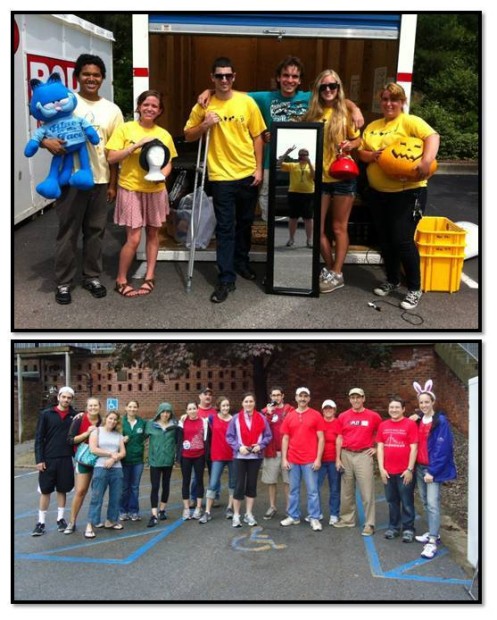We have much more to do and your continued support is needed now more than ever.
Campuses Aim for Zero-Waste Move Out
College dorm rooms are really good places to accumulate stuff. Beyond textbooks and late-night snacks, students in dorm rooms tend to amass a funny collection of miniatures–refrigerators, rugs, coffee pots–and things that are more or less useless to young people beyond campus borders–shower caddies, bedrisers, and um, shower caddies. Luckily, at campuses across the country, students, staff, faculty and administrators are addressing the enormous move-out waste issue by developing programs to redirect furniture, electronics, books, nonperishable foods and more that students no longer want from the landfill to locals, charities, and back to other students. On facebook and twitter we noticed lots of posts and tweets encouraging students to donate their stuff, and a few funny photos of your finds. So, we decided to ask you to tell us how you’re reducing waste during move-out. If we missed you here, please tell us about your program in the comments below, or share photos with us on facebook.

- Coastal Carolina University, Conway, South Carolina: Campus Salvage. In its fifth year, Campus Salvage collects just about anything, including clothing, furniture, mini fridges, cleaning products, school supplies and non-perishable food. The purpose of the program is to collect unwanted, good items from the 3,000 students moving out from campus and save it from going into the landfill. There are five locations of PODS setup throughout the residence halls during move-out week. Items are either donated to local charities (men’s and women’s shelters, animal shelters, food banks, etc.) or sold at the Community Sale. The Campus Salvage Community Sale is open to the public a week after collection and includes between 12 to 15 PODS full of donated items from students. Most items are $1 each, with the exception of high ticket items such as mini fridges and microwaves. A lot of the people that come to the sale include public school teachers and parents with children heading to college in the fall. Campus Salvage grows more popular every year and it’s very rewarding to be able to keep all these items out of our local landfill!–description thanks to Jennifer Sellers, Sustainability Coordinator at Coastal Carolina University
- Skidmore College, Saratoga Springs, NY: Give+Go. Skidmore College recently launched the seventh annual “Give+Go,” a two-week program that collects and donates items left behind by students at the end of each academic year. The program prevents thousands of pounds of usable items from going into the landfill by donating them to organizations that support individuals and families in need, including the NY/NJ Chapter of Goodwill and Backstretch Employee Service Team (B.E.S.T.), a local organization that supports over one thousand racetrack workers in Saratoga Springs, NY. In order to collect unwanted items, Sustainable Skidmore partners with the college’s waste hauler and Goodwill. These organizations provide collection bins for each residence hall and apartment building on campus. Goodwill and B.E.S.T. also assist in collecting donations during two of the busiest move-out dates. Volunteers provide the majority of the labor required to make Give+Go possible each year. Over the two-week collection period, Skidmore staff, faculty, and students volunteer time during lunch and on weekends to collect items from the campus residence halls. Nearly 20 volunteers came to campus on Saturday May 11th, to sort through and collect items for B.E.S.T. and Goodwill. The final collection day for this year’s Give+Go is the day after commencement.–description thanks to Rachel Willis, Sustainability Fellow at Skidmore College
In addition to the help these types of move-out programs provide to the community, some programs save students money and eliminate the need to buy new by hosting back-to-school yard sales. In addition, student-run move-out programs build valuable skills in leadership and event management!
- Northland College, Ashland, Wisconsin: SCRAM! Sustain. Conserve. Recycle. And. Move-out. SCRAM! is the move-out theme at Northland College. The Sustainability Office figured a clever acronym and a recognizable mascot (Sesame Street’s Oscar the Grouch) would attract more attention from the students and encourage residents to be thoughtful about their move-out habits. In an attempt to limit waste, Northland College is boosting opportunities for single-stream recycling and donations. SCRAM! runs in the final week before dorms close. As part of the program, each residential building is equipped with two side-by-side 12 yard dumpsters. One is for trash, one is for recycling. Each building also has a designated indoor space for donations (clothing, linens, furniture, housewares, etc). The donation sites are located in convenient, well-traveled locations (namely 1st floor lobbies and lounges), to increase participation. The majority of the donated items are added to the inventory of the ReUse Room. The ReUse Room is located on campus and is set up as a secondhand store – the only difference is that everything is free! If and when the ReUse Room reaches capacity, the rest of the goods are donated directly to the community.–description thanks to Sarah Christofferson, Sustainaibility Fellow at Northland College
- University of New Hampshire, Durham, NH: Trash 2 Treasure. Approximately half of the 13,000 undergraduates attending the University of New Hampshire live on campus; each month they throw away about 25 tons of trash. However in May, that number rises dramatically to 120 tons due to move-out waste. In 2010, UNH had 13 extra 30-yard dumpsters delivered to campus just to handle move-out waste. The mission of the Trash 2 Treasure (T2T) program, started by the UNH Student Environmental Action Coalition (SEAC), is to reduce this move-out waste and reduce UNH’s overall contribution to landfills. Each May, T2T collects all of the usable stuff that students donate or throw away (all T2T members are official dumpster divers!), store and clean it over the summer, and then hold a 3-day yard sale during move-in weekend, selling it all back at reasonable rates to incoming and returning students. The income generated from the yard sale is used to pay for the costs of running the program over the next year. This model makes T2T the first student-run, self-sustaining program of its kind. T2T’s founder Alex Freid, and other T2T leaders are now working with students at other campuses to build similar, self-sustaining programs and the overall movement of students committed to waste reduction as part of the Post-Landfill Action Network (PLAN).–description adapted from “About UNH T2T;” additional information thanks to Alex Freid, Founder and Executive Director, PLAN
Tell us how YOUR campus reduced waste during move-out 2013. Share photos on our facebook wall or comment below.
Related Reading:
- Find out how to bring PLAN to your campus: http://www.postlandfill.org/
- Graduate with zero carbon debt! NWF and CarbonFund.org partnership to bring your campus premium-priced carbon offset opportunities.
- Like Campus Ecology on facebook, and follow @CampusEcology and @YouthforClimate on twitter.





















